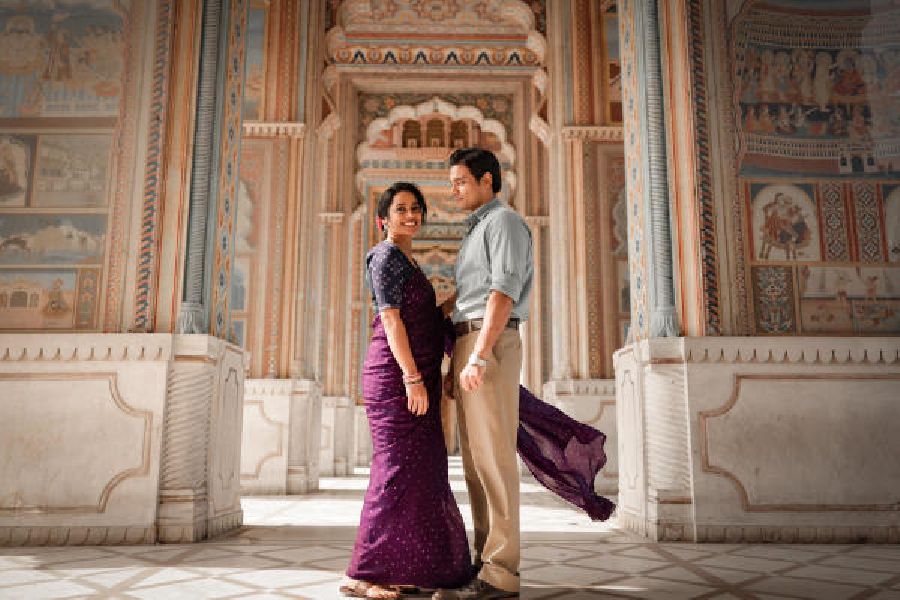Four Years Later, a relatable story about marriage, relationships and the distance that arises between partners, is now streaming on Lionsgate Play. Starring Shahana Goswami and Akshay Ajit Singh in the lead, the Australian production is now on Indian screens after a good run on Australian TV (SBS), where it was largely shot and commissioned. The Telegraph chatted with Shahana to know more.
What was the experience of being a part of Four Years Later, a story relatable to many on multiple levels?
I felt the scenes were written in a way that was refreshing... it felt like a new take on relationships... it isn’t about silly blame games and stereotypical polarising of men and women. It was more nuanced, human and relatable to my own experience of relationships and to the conversations I have had with friends about relationships. Sridevi’s (her character) personality is very close to mine in many ways. Mithila Gupta, the creator, showrunner and co-producer, made Sridevi a little bit like herself, and she and I are very similar.

Shahana Goswami with Akshay Ajit Singh in Four Years Later, streaming on Lionsgate Play
In Four Years Later, I get to show a more joyful, vivacious, open side of me that in most of the characters I have played so far, I have not been able to. In many of my films, I have not even had the opportunity to smile, leave alone laugh and be vivacious!
Another factor was that at the lovely ripe age of 38, to be offered a romantic lead in a show, is heartening. It has taken 20 years for me to be offered a romantic role. Also, the sheer joy to see that an Australian channel commissioned a series with two Indians in the lead speaking in their own accent and who lived in India and had just started living in Australia.... I don’t think any other show like this exists. An Indian in the lead in any other international project will invariably be a native speaker — whether they are naturally native speakers or they put on an accent and become native speakers. For me, this was a pathbreaking aspect.
In the Indian creative space, we are slowly moving towards being age-agnostic, at least on OTT. Do you think you could be offered a romantic lead in an Indian project today?
I do believe that we are a lot more age-agnostic today and I feel, especially for women, there is greater opportunity to be able to work through various phases, stages and ages. I have never lied about my age but both Santosh (her recent, much-feted film) and this project are of a character that is younger than me.
But at 22, I was playing a 32-year-old, so it doesn’t really matter to me. In today’s creative space, there are certain biases that might play out, but largely speaking, that aspect has shifted to a large extent.
Is there anything about Sridevi, who you said is pretty relatable, that you found difficult to grasp or reconcile with?
Sridevi is a hardcore romantic. For her, romance, partnership and having a family has a centrality which, for me, has never been the case. I am known for speaking about openness and polyamory and not constricting relationships by moral or social standards, but rather allowing two people to figure out what their dynamic is and what works for them.
Your character shifts continents to be with the man she marries. You put your life and career in Mumbai on hold for a few years when you shifted bag and baggage to Paris. Did that experience and familiarity help in any way in playing Sridevi?
I easily and quickly adapt to places and so I didn’t feel it. In fact, even Sridevi flourishes when she goes to Australia. She feels much more trapped in Jaipur, especially post-marriage because she is living with her in-laws, who have a very different value system from hers.
I haven’t ever felt restricted because my family is very open-minded, very encouraging of whatever differences there might be and have encouraged me to be an independent human being.
There have been phases and spaces where I have felt that I am not understood. But acceptance has always been there. Whether I have been understood fully or not... that is definitely a fish-out-of-water feeling that I have had from time to time.
You have pretty much even handled your career your way...
That is true. I have managed to do everything by my standards and my way. When I started out, I was told I needed to have a portfolio and that I needed to do this and that. I didn’t do any of it and still got to where I am today. I have never done anything that, to me, felt like a compromise. If that meant losing out on something, then so be it. I am lucky that I got to do things my way throughout my life — including shifting my base to another country for four years. Before that, I was only doing international projects that did the rounds of film festivals but didn’t release in India.
So, audiences had not seen me for almost eight years in any theatrical release in India. Despite that, I have subsequently managed to have a great run in the OTT space and get prominent, interesting characters to play. Despite not sticking to the norm, I have been constantly rewarded.
When we had spoken a few months ago at IFFI in Goa, you had said that Despatch, the film you were promoting then, had come to you at a time when you were looking to ‘learn, grow and regenerate’. Is that the goal now with every project you do?
The constant feeling is to keep going with my gut, allowing things to flow.... One thing I have learnt in this industry — and in life in general — is to know which things to say ‘no’ to. The ‘nos’ are what make space for the things that you truly desire. If you end up saying ‘yes’ out of insecurity or fear, you are not creating space for the change you want. I only do things that I feel a sense of excitement about. For a whole year, I kept saying ‘no’ to offers till Santosh came to me. If my heart is not deeply excited at the prospect of doing something, I won’t do it because I don’t want to get jaded.
I love what I do too much to make it a job. It does pay my bills. It is my career. But it is too precious to me — emotionally and psychologically — for me to treat it as just a money-making exercise.
What are you working on now?
A friend has come up with an idea for a travel show that explores the spiritual and cultural aspect of different countries. I was excited to play host and be a producer... it felt like the most innate and natural thing for me to do. There is another project that came in unexpectedly which is again a collaboration with another friend.
The structured platform or studio-driven stuff is banal for me. The choices that are being made, the considerations, the things that are being asked of from the creative teams... it disappoints me. But the independent producing world still comes from a space of passion. I enjoy that experience of collaboration where people come together because of a vision and not because they are going to make a buck and everybody is disjointed in their vision and passion.
Things are driven too much by an algorithm these days...
True. We are again going back to the same stuff. Pehle tum star ko leke paagal ho jaate thhe, ab tum influencers ko leke paagal ho rahe ho. There is no problem with an influencer being an actor — there some who are very good — but the fact that they have a sizeable social media following should not be the reason why you are signing them up for an acting job.
But a large number of creators and producers are actually doing that now— looking at how many million followers a person has. That is disappointing because the whole point of OTT was to make this process more focused on the creative aspect. And when that was followed, it did well. People have come up and become well-known actors. But the higher lot — in terms of the people who are making decisions — are still stuck in that same non-creative modality.
Santosh has had long legs on the festival circuit, it was the UK’s entry for the Oscars and whoever has watched it has only praised the film. Its release in India has, however, been indefinitely delayed because of censorship issues. I know that you detach yourself from your projects once you are done with them, but this must be such a huge disappointment...
I realised, Cannes (Film Festival) onwards, that no matter which country a viewer came from, their takeaway from Santosh was the same. Even though it is deeply rooted in specific aspects of Indian society and culture, it is universal because the aspect of power play and how it affects human nature is universal. Those who have watched it, have picked up on each of the nuances, each of the unsaid layers....
But when the film didn’t end up coming here, my sense of judgment felt broken. I thought that maybe life is already so tough for people of a certain socio-economic status, they don’t want to watch films that are serious and hard-hitting... they want to seek entertainment which helps them escape reality.
But the number of messages I have got from people who have watched the film through some means or the other, has been eye-opening. In fact, watching Santosh has become a rebellious act in some way. People have found ways to watch the film and reached out to tell me how much they loved it. It made me realise how well Santosh would have done if it had released in India, or even been streamed on OTT.
It makes me sad but I also realise that the film getting a release would not have had that kind of curiosity for it. So how do you separate the chicken from the egg? You can’t. I am still hopeful that Santosh will find some way to release here. I am an eternal optimist.










